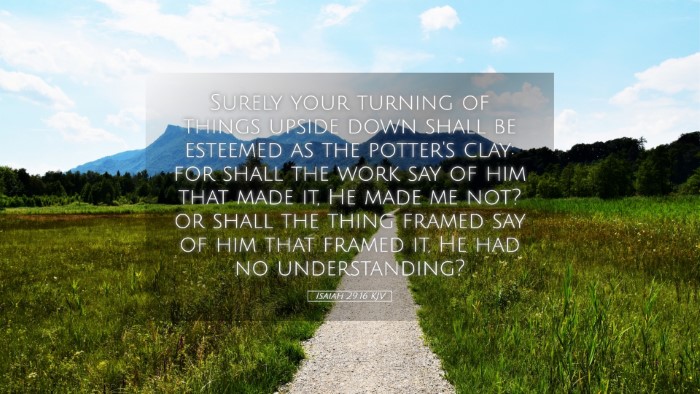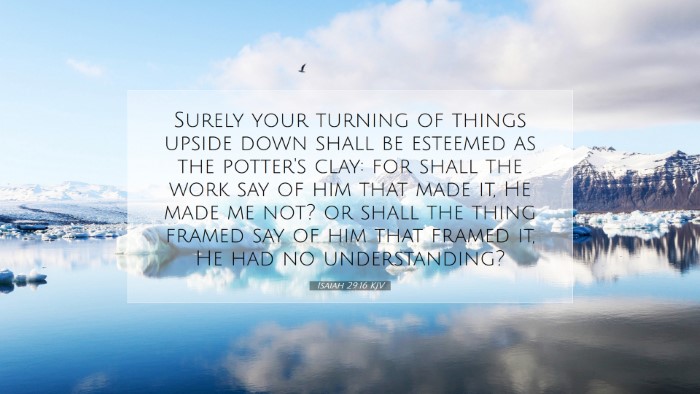Commentary on Isaiah 29:16
Verse Text: "Surely your turning of things upside down shall be esteemed as the potter's clay: for shall the work say of him that made it, He made me not? or shall the thing framed say of him that framed it, He had no understanding?" (Isaiah 29:16, KJV)
Contextual Overview
Isaiah 29 is part of a prophetic warning against Jerusalem, illustrating the spiritual blindness and moral decay of the people. This verse critiques a perverse understanding of God and His creation, revealing the folly of treating the Creator and creation in an inverted manner.
Theological Implications
1. The Reversal of Divine Order
Matthew Henry notes that the expression "turning of things upside down" signifies a profound misalignment of priorities and an affront to God’s created order. The people of Israel were indulging in idolatry and rebellion, which led them to invert the truth about God's nature and their identity as His creation.
2. The Creator-Creation Relationship
Albert Barnes emphasizes the relationship between the Creator and His creation. The absurdity of the clay questioning the potter highlights the arrogance of humanity in its tendency to deny God’s authority. People cannot declare their independence from the Creator who formed them, which serves as a reminder of the inherent limitations of humanity.
Exegetical Analysis
The comparison to pottery in Isaiah 29:16 serves as a rich metaphor. Adam Clarke elaborates that just as clay cannot argue with the potter who shapes it, so too must humanity recognize its place beneath divine sovereignty. The rhetorical questions posed emphasize the foolishness of the created attempting to question or criticize its Creator.
Practical Applications
This verse brings several practical implications for believers and leaders within the church:
- Emphasizing Humility: Acknowledge the greatness of God and the limitations of human understanding. Leaders should model humility and submission to God's will.
- Understanding Authority: Recognizing that God's authority is inherent, and human attempts to undermine it result in chaos and confusion in society.
- Sermons and Teaching: Pastors can use this verse to highlight the need for repentance and alignment with God's divine order. It serves as an invitation to correct our understanding and embrace biblical truth.
The Significance of Language
The language used in this verse is dynamic, presenting a stark contrast between the expectations of righteousness and the actions of the people. The term "esteemed" indicates how misled values can become normalized within society. When God’s standards are abandoned, it leads to moral decay.
Barnes points out that such language serves as a prophetic challenge, urging the people to reflect and reassess their lives and beliefs. The urgency in Isaiah's tone is a clarion call to repentance, evidencing God’s desire for restoration rather than judgment.
Conclusion
Isaiah 29:16 is a poignant reminder of the necessity for humans to recognize their created status and the folly of questioning God’s wisdom and authority. It reveals profound theological truths about God’s sovereignty, the relationship between Creator and creation, and the need for humility in understanding His plans.
For scholars, this verse opens avenues for discussing the broader cosmic order established by God and how humanity’s sin distorts it. For pastors, it is a call to guide their congregations back to a rightful understanding of divine hierarchy.
In essence, this verse invites deep reflection on our standing before God, urging us to embrace our role within His created order rather than challenge it. Therefore, let us heed Isaiah’s warning and avoid the pitfalls of turning God’s truth upside down.


